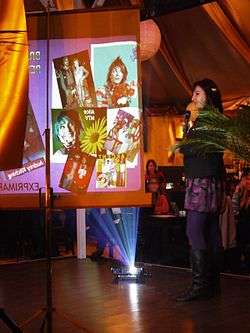PechaKucha

PechaKucha (Japanese: ペチャクチャ, IPA: [petɕa ku͍̥tɕa],[1] chit-chat) is a presentation style in which 20 slides are shown for 20 seconds each (6 minutes and 40 seconds in total). The format, which keeps presentations concise and fast-paced, powers multiple-speaker events called PechaKucha Nights (PKNs).[2][3]
PechaKucha Night was devised in February 2003[4][5] by Astrid Klein and Mark Dytham of Tokyo's Klein-Dytham Architecture (KDa), as a way to attract people to SuperDeluxe, their experimental event space in Roppongi, and to allow young designers to meet, show their work, and exchange ideas.[6]
In 2004, a few cities in Europe began holding PKNs, the first of several hundred cities that have since launched similar events around the world.[7][8] As of May 2016, PKNs were held in over 900 cities worldwide.[9]
Format
A typical PechaKucha Night (PKN) includes 8 to 14 presentations. In each presentation 20 slides are shown for 20 seconds each. Organisers in some cities have added their own variations to the format. In Groningen, in the Netherlands, two slots are given to a live band, and the final 20 seconds of each presentation consists of an immediate critique of the presentation by the host’s sidekicks.
The audience is usually from the design, architecture, photography, art and creative fields, but also from academia.[10] Most presenters are design professionals showing their creative work, but presenters often speak about such topics as their travels, research projects, student projects, hobbies, collections, or other interests. Video art has also been presented at some events.
Protocol for starting a PechaKucha Night
To start a PechaKucha Night, potential organizers contact the PechaKucha organization, and after an informal application process, exchange a "handshake" agreement.[11] There are no limitations to a PechaKucha night. Anyone is invited to partake in the presentation.
PechaKucha is a registered tradename of Klein-Dytham Architecture (KDa).[2][3][12] The PechaKucha terms of use require presenters to "grant PechaKucha Night certain non-exclusive rights and license to reproduce their appearance."[13] Event flyers are posted on the global PechaKucha Daily blog,[14] while videos of presentations are posted online as well.[15]
See also
- Lightning talk: A similar presentation format.
- Ignite: A similar presentation format. Oregonian article
- Speed geeking: 5-min presentations that are simultaneous, rather than sequential. Participants rotate through presentations in one room or chat space.
References
- ↑ Japanese pronunciation at Forvo
- 1 2 "Case details for Community Trade Mark E5374426". United Kingdom: Intellectual Property Office. 11 February 2008.
- 1 2 "Case details for Trade Mark 2417930". United Kingdom: Intellectual Property Office. 9 June 2006.
- ↑ Jean Snow (July 17, 2006). "All Talk". Time. Retrieved 2012-07-04.
- ↑ "PechaKucha 20x20 - Tokyo - Vol. 1". Retrieved 23 May 2014.
- ↑ Jean Snow (June 9, 2006). "20/20 Vision: The Tokyo-born Pecha Kucha phenomenon has the global creative community hooked". Metropolis. Retrieved 2007-02-26.
- ↑ "PechaKucha 20x20".
- ↑ Daniel H. Pink (2007-08-21). "Pecha Kucha: Get to the PowerPoint in 20 Slides Then Sit the Hell Down". Wired (magazine). Retrieved 2009-09-29.
- ↑ "PechaKucha 20x20 - Global". Archived from the original on 30 May 2016.
- ↑ Allis, Sam (2010-06-28). "Designed to inspire". The Boston Globe.
- ↑ "PechaKucha 20x20 - Start a City". Retrieved 23 May 2014.
- ↑ "PECHAKUCHA". USPTO. July 12, 2011.
- ↑ "PechaKucha 20x20 - Terms Of Use". Retrieved 23 May 2014.
- ↑ "PechaKucha 20x20 - PechaKucha Daily Blog". Retrieved 23 May 2014.
- ↑ "PechaKucha 20x20 - Watch". Retrieved 23 May 2014.
External links
- PechaKucha 20x20
- All talk - Time magazine
- Short Wired piece and example PechaKucha by Daniel Pink